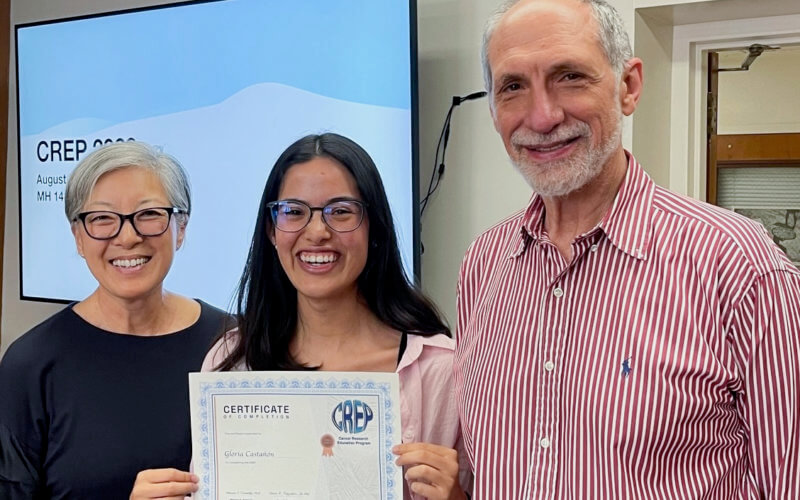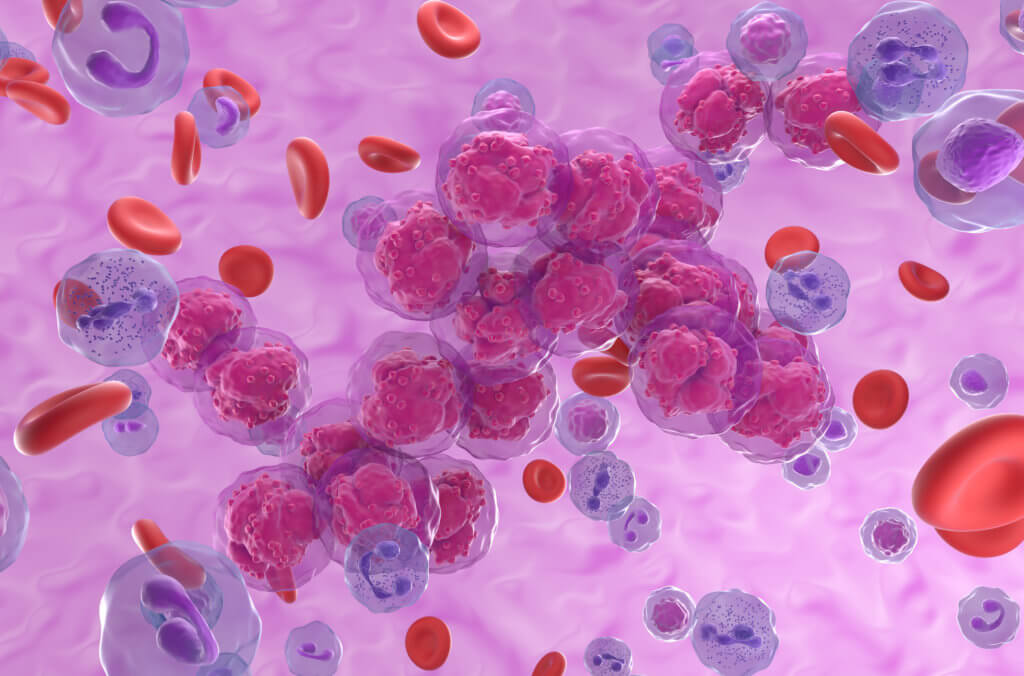
For biological science student Gloria Castañón, studying cancer treatment disparities among the Hispanic population is personal. Family members have been diagnosed with breast, lung and prostate cancers.
Castañón grew up in Oxnard in Ventura County, where her family worked in strawberry fields and picked other crops.
“Finding out more about cancer is especially important to me because I come from an agricultural community in which my family is exposed to harmful pesticide-related toxicities,” she said. “The lack of health care knowledge directly impacted my father, grandmothers and paternal grandfather.”
Castañón is learning about cancer and treatments as an undergraduate researcher in Cal State Fullerton’s Cancer Health Equity Research Partnership, which trains students in cancer disparities research.
Health disparities are gaps in the quality of health and health care that mirror differences in socioeconomic status, racial and ethnic background, and education level, according to the National Institutes of Health.
Marcelo E. Tolmasky, professor of biological science and director of CSUF’s Center for Applied Biotechnology Studies, directs the grant program, which partners with UC Irvine’s Chao Family Comprehensive Cancer Center.
“This firsthand experience is helping me to identify inequities experienced by marginalized communities and has reinforced my desire to solve health care disparities,” Castañón said.
Her research project addresses treatment disparities in Hispanic adults with B-cell acute lymphoblastic leukemia (ALL), a blood and bone marrow cancer.

In 2021, Cal State Fullerton was awarded a $905,787 grant from the National Institutes of Health’s National Cancer Institute for the program. So far, the university has received $683,612 in funding for the four-year program.
“The grant program focuses on providing cancer research education to build a pipeline of diverse future scientists in cancer health disparities research,” Tolmasky said.
“This partnership with UCI will contribute to the enhancement of cancer health equity research in Orange County through the development of institutional capacities, support of meritorious joint cancer research pilot projects, and the provision of cancer research experiences and programs for underrepresented students.”
Twenty undergraduate and graduate students, called Cancer Research Education Program Scholars, have been selected for the program. While current scholars are studying science and public health, the program is open to all majors, Tolmasky said.
Ten students, including Castañón, started the program in fall 2022, and a new class of 10 scholars began this fall. Undergraduate students spend five semesters in the program, while graduate students complete their training in three semesters.
CSUF and UCI researchers also collaborate on pilot projects centered around the study and disparities of triple-negative breast, ovarian and testicular cancers and tumor growth.
Students receive research training with CSUF faculty in laboratory skills and scientific communication, take additional coursework on topics in public health and health care disparities, and attend seminars and conferences. In the summer, students spend 10 weeks working alongside research mentors at the Chao Family Comprehensive Cancer Center.
This summer, Castañón worked under the mentorship of Shawn P. Griffin, UCI health sciences assistant clinical professor in the Department of Clinical Pharmacy Practice. She worked with patients and combed data from their charts to compare two treatment regimens for adult patients with acute lymphoblastic leukemia. While this is a common type of cancer in children, it also affects older adults.
Castañón is collecting data to determine treatment-related toxicity in Hispanic patients receiving pediatric-inspired regimens.
“This regimen has been the standard of care for adults who have ALL, but potentially causing a disparity within the Hispanic population,” she added. “We hypothesize that adult Hispanic patients who receive pediatric-inspired regimens have worse outcomes.”
The researchers plan to publish their results early next year, with Castañón a co-author on the research.
“The research is important because we want to decrease cancer health disparity within the Hispanic population and provide a more ethical and effective way of treating patients diagnosed with ALL,” Castañón said.
“I saw how my research could impact future patients by reassessing chemotherapy regimens and providing better patient outcomes for the Hispanic community.”
Castañón plans to present her research project at the 2023 CABSCon 8 meeting on Dec. 1, sponsored by the Center for Applied Biotechnology Studies.
Castañón transferred to CSUF in 2021 from Ventura College. She serves as a CSUF ambassador for the Hispanic Association of Colleges and Universities and a peer adviser for Project RAISE. She also volunteers with the Flying Samaritans, a student organization that offers free medical treatment to people in the border town of El Hongo in Tecate, Baja California.
By participating in the research program, Castañón was introduced to opportunities in the pharmacy field. After she finishes her bachelor’s degree program this fall, she plans to pursue a doctorate in pharmacy to become a pharmacist-scientist and is currently applying to pharmacy schools.
“Being a part of the grant program has inspired me to lead transformational changes in the health care system by researching ways to strengthen access to education and care for under-resourced and underserved communities,” she said.